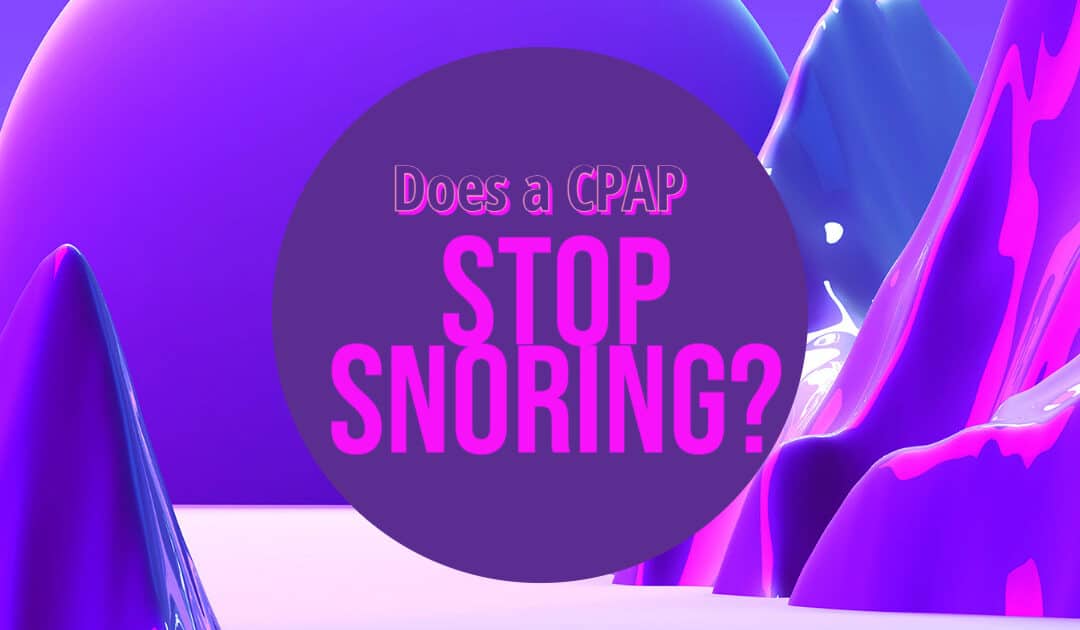Does a CPAP Machine Stop Snoring?
If you snore nightly, you may feel desperate for a solution, especially if you have a partner who sleeps with you. The snoring of one partner in a relationship often sends the other partner to sleep in another room- creating the modern term “Sleep Divorce.” Whether you have a partner or not, snoring can also be dangerous. Individuals who snore often suffer from sleep apnea, a condition that increases risk factors for dangerous health conditions. CPAP machines, which deliver continuous positive airway pressure through the mouth and/or nose to keep the airways open during sleep, provide a solution for sleep apnea sufferers. But does a CPAP machine stop snoring? Let’s look at how CPAP machines stop snoring and whether a CPAP may help you get a better night’s sleep.
What Causes Snoring?
Snoring is caused by your airway partially collapsing on itself while you sleep. The soft tissues of your throat and mouth flap about against each other creating snoring noises when you breathe in and out. If snoring causes your airway a significant struggle to stay open, you may face a diagnosis of sleep apnea. Habitual snoring is highly prevalent and is often associated with underlying obstructive sleep apnea (OSA).
Sleep apnea diagnosis occurs when your struggle to breathe while asleep reaches a level that impacts your overall health. Not getting enough oxygen while you are asleep can make you drowsy during the day. You may also suffer from difficulty concentrating and decreased productivity.
Sleep apnea can even increase your chance of facing severe health issues such as stroke, high blood pressure, or heart attack.
How Does a CPAP Machine Work to Stop Snoring?
Using a CPAP machine can effectively stop snoring by creating continuous positive air pressure that keeps your muscles from collapsing. In this way, the soft tissues of your neck, throat, and mouth do not partially block your airway, creating the “snore” sound. This can help eliminate snoring by keeping the throat more fully open throughout the night.
CPAP machines also reduce your risk of health complications from sleep apnea. CPAP therapy is efficient and effective in controlling snoring and OSA. Getting a solid diagnosis for your snoring and using a treatment that works for you is crucial for your future health.
You CAN Stop Snoring
Seeing an ENT doctor can help diagnose why you snore and find solutions to the problem. Various methods and products are available to alleviate snoring, including lifestyle changes, anti-snoring products, and oral appliances. Usually, you participate in a sleep study so that the doctors can see how often you don’t breathe well. They will then let you know your sleep apnea severity level and what solutions are available to help you manage your sleep apnea symptoms.
Even though CPAP machines work well to stop snoring and other sleep apnea conditions, many do not use the machine as prescribed. Many individuals simply stop using their CPAP machines.
“Studies suggest that from one-third to more than 50% of patients either stop using their CPAP machine or never bother to fill their prescription… because the device can be cumbersome and uncomfortable.” (3)
CPAP machines are large and unwieldy, with a mask that often covers both your nose and mouth. Keeping the mask in place by sleeping on your back can cause insomnia for side-sleepers. Others complain of feeling claustrophobic from the mask and the pressurized air pushing into their lungs.
Some patients adjust to the mask, hose, and new sleep position. Others see their ENT doctor to adjust the air pressure or even switch to a BiPAP machine that fluctuates the air pressure while breathing out. If a CPAP is not for you, keep talking with your ENT doctor until you find a solution. Your health and well-being are at stake.
A New Alternative to CPAP
Other newer medical devices also work by opening airways. Inspire is the only FDA-approved obstructive sleep apnea treatment that works inside your body to treat the root cause of sleep apnea with just the click of a button. It’s a small device placed during a same-day outpatient procedure.
You simply click the remote to turn Inspire on when you’re ready for bed. While you sleep, Inspire opens your airway, allowing you to breathe normally and sleep peacefully.
Your ENT doctor can help you assess whether this cutting-edge medical device may treat your sleep apnea without the mask or hose of the CPAP machine.
Finding a Solution
If snoring affects your sleep quality, it’s time to find a solution that works for you. Allowing snoring to affect your daytime wakefulness is less than you deserve. Daytime sleepiness is a common symptom of sleep apnea, resulting from repeated pauses in breathing during sleep. Snoring and sleep apnea are treatable conditions that have available medical answers.
If a CPAP machine does not work for you, it’s crucial to find other solutions to reduce your risk factors for sleep apnea-related health conditions. Losing weight can significantly reduce snoring by decreasing excess weight around the diaphragm and throat. Go ahead and see your ENT doctor to determine if CPAP, surgery, or another medical device may help treat sleep apnea. Additionally, addressing nasal congestion with over-the-counter drugs, nasal strips, or medications can facilitate easier breathing.
We Can Help
At Enticare, our board-certified ENT doctors provide treatment for health issues of the ears, nose, and throat. Our sleep-focused team includes surgical providers, nurse practitioners, respiratory therapists, and sleep technicians. We work with both children and adults to treat sleep disorders.
You can sleep well and wake up feeling refreshed again. Whether surgery, CPAP, or another medical device such as Inspire is your best route, you can get your zzzs and feel energetic once more. Contact us to make an appointment today. Get started finding solutions to feel like yourself again.
Footnotes:

